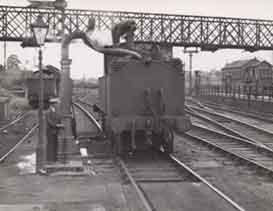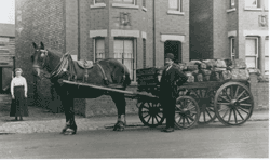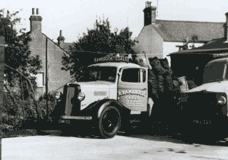|
 |
 |
 |
 |
 |
 |
 |
 |
 |
 |
 |
 |
 |
 |
|
|
|
London And North Western Railway 1846-1923
|
|
|
|
|
|
 |
|
|
Steam Engines taking on water |
|
|
|
|
|
|
|
|
 |
|
Steam engines needed to take on water and coal frequently to enable the driver to keep the engine in steam. The coal was mostly carried either on the engine or in the tender which ran behind the engine. However the water level needed to be filled up at regular intervals. One such watering place was near Leighton station. A grant had to be obtained every 7 years from Mr Wyndham Edward Hammer of Stockgrove to allow the L&NWR to take water from a rivulet running into the River Ousel near the station. The grants for 7 years obtained on 17 November 1875 and 13 January 1882 cost £15 per year. |
|
|
 |
|
 |
|
|
|
|
|
|
|
|
 |
|
|
Steam engine 58926 taking on water at Leighton Buzzard station. |
|
|
|
|
 |
|
|
Coal at Leighton Buzzard |
|
|
|
|
|
|
|
|
|
 |
|
|
In 1848 Leighton Buzzard had 971 tons of coal delivered. This proabaly would have been stored on the site of the old station. Eventually two goods depots and extensive siding facilities were situated with the new station. There were also goods sheds and sidings for general merchandise and livestock north of the station. This was so restricted that another goods shed had to be built at Grovebury with coal drops. Coal was then taken from these facilities round town by horse and cart initially and then by motor truck. |
|
|
 |
|
|
 |
|
|
 |
|
|
 |
|
|
War Years |
|
|
|
|
|
|
|
|
|
|
 |
|
|
The war years took their toll on Leighton Buzzard. In 1917 the L&NWR instructed that no trains from Euston should stop at Leightion station between 11.00am and 2.40pm. Bletchley became the control centre for the railway lines north of Tring to a point just south of Roade. This was needed to administer the heavy traffic that the war generated. The war had few benefits, but Leighton trade did benefit when cheap sand from the ballast of ships ceased to enter the country. The existing pits in the district were given a tremendous boost to meet the demands for sand that were not being met due to the sand not coming in on the ships. |
|
 |
 |
|
|
|
|
|
|
|
 |